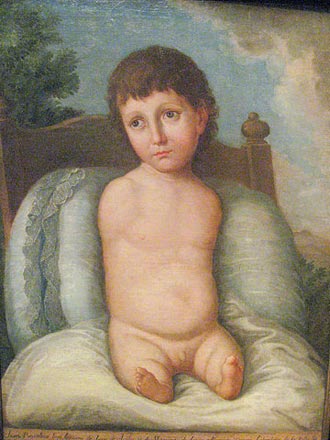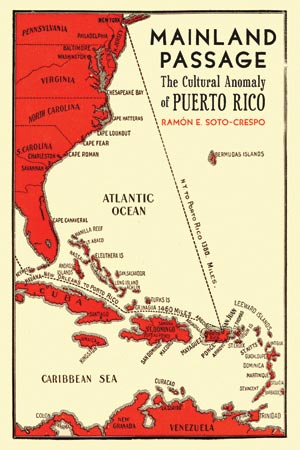
Mainland Passage is a historical and cultural study of the Puerto Rican mass migration to New York City in the 1940s and how this migration ultimately created a Puerto Rican cultural borderland. I call this crucial migration the mainland passage because it served to strengthen Puerto Rico’s political relationship with the United States.
The book describes how this passage to the mainland was coordinated with the creation of a new state apparatus in Puerto Rico—the borderland state. As a new form of political belonging, the borderland state combines attributes from conventional political forms (such as the sovereign nation-state and the federated state), but refuses to be either.
Mainland Passage elucidates how these two historical events, the mainland passage and the creation of the borderland state, mark a departure from conventional political and national forms. The Puerto Rico status debate has managed to devalue these historical events and as a result the most discussed options, of statehood or independence, represent false political alternatives.
“As a new form of political belonging, the borderland state combines attributes from conventional political forms (such as the sovereign nation-state and the federated state), but refuses to be either.”
Mainland Passage identifies a neglected historical tradition of Puerto Rican writing, exemplified by Antonio Fernós Isern, Luis Muñoz Marín, Luis Muñoz Rivera, and Antonio S. Pedreira, that theorizes political belonging outside the dominant nation-state ideology.
For decades their thinking was regarded as incomprehensible. After the rise of Third World decolonization movements, it was relegated to the archives of politically abstract discourses understood as complicit of colonialism. This perception started to change in the late 1990s, when Puerto Rican scholars began questioning conventional theories of nationalism.
A groundbreaking moment came with the publication of Chicana writer Gloria Anzaldúa’s Borderlands/La Frontera (1987), which legitimized the study of those spaces created in between conventional forms, that is, borderlands. Anzaldúa’s manifesto argued that anomalous political and cultural constructs should be understood in their own terms.
By adopting Anzaldúa’s theory as a lens to look at Puerto Rican writing, I was able to detect particularities of the Puerto Rican condition that have remained obscure when viewed through the national lens. Not only did previously rejected writings become more legible, but also a decades-old pattern of thinking started to emerge. There was a specific borderland style of thought particular to the Caribbean region, which found expression in Puerto Rican writing.
I discovered that this specific borderland thinking became institutionalized as the political philosophy behind the 1951 Puerto Rican Constitution, decades before Anzaldúa’s writing. At the same time, it became clear that affirming a political anomaly would be exceptionally difficult in the heyday of worldwide nation-state dominance.
Ever since the 1950s, the Puerto Rican borderland state has struggled to be understood in its own terms and has struggled against international and domestic forces that want it to be “normal” (i.e., a sovereign nation-state). Most of the scholarship on Puerto Rico and on the Puerto Rican diaspora in the U.S. shares this normalizing perspective.
In this context, Mainland Passage articulates a contrarian perspective. The book affirms Puerto Rico’s cultural and political anomaly as its most significant contribution to global diversity. I argue that this particular political anomaly has defied the regimes that have attempted to normalize it needs to be understood in its own right.
In the book’s introduction I explain Puerto Rico’s state in relation to other commonwealth states.
Chapter One, “State and Artifice,” examines the eighteenth-century paintings of José Campeche and the nineteenth-century painting of Francisco Oller to show the importance of the political state in Puerto Rican culture. In this context, painting provides a visual account of the discursive limits of the Puerto Rican state. More importantly, painting captures the idea of a passage in the Puerto Rican imagination where stasis and mourning are left behind in favor of an unconventional future.
Chapters Two and Four, “The Mainland Passage” and “Out of the Mainland,” examine closely the prose and poetry, of the Latina and Nuyorican writers in the U.S. mainland. Nuyorican poetry tells us the unknown history of the mainland passage from the perspective of those communities that were formed in the urban areas of metropolitan New York City. Boricua politics, their invention, provides us with an account of the development and perseverance of a Puerto Rican identity in the diaspora. For this purpose, I examine previously overlooked publications by urban political writers that provide us with detailed accounts of those political changes in the Nuyorican enclaves of New York.
Chapter Three, “Escaping Colonialism,” scrutinizes Puerto Rico’s Commonwealth Constitution and elucidates the political strategies behind its institutionalization in 1951.

“The borderland state challenges the idea of nation-state or political nationalism as the only possible venue for the creation of a collective entity.”
Mainland Passage challenges readers to understand non-normative forms, of governance and of belonging, in their own context. This implies not only diversity on different modalities within the nation-state form, but also diversity in the shape of those forms themselves.
In the Puerto Rican context it means that a non-normative state was institutionalized in 1951. It means that this borderland state introduces an affirmative perspective in the Puerto Rican context. In the Latin American context the borderland state challenges the idea of nation-state or political nationalism as the only possible venue for the creation of a collective entity.
To embrace this institutionalized political form means to affirm cultural difference. To negate it, to claim that it is colonial, would only lead to a rejection of one of the most insightful contributions to contemporary global diversity.
In other words, to fail to understand the Puerto Rican borderland in its own right would lead us to a world ruled by more of the same.


Ramón E. Soto-Crespo is Associate Professor of American Studies and Director of the Latina/o Studies Program at the State University of New York at Buffalo. His essays have appeared in ALH, MLN, MFS, Contemporary Literature, Textual Practice, and in publications by the University of Chicago Press.